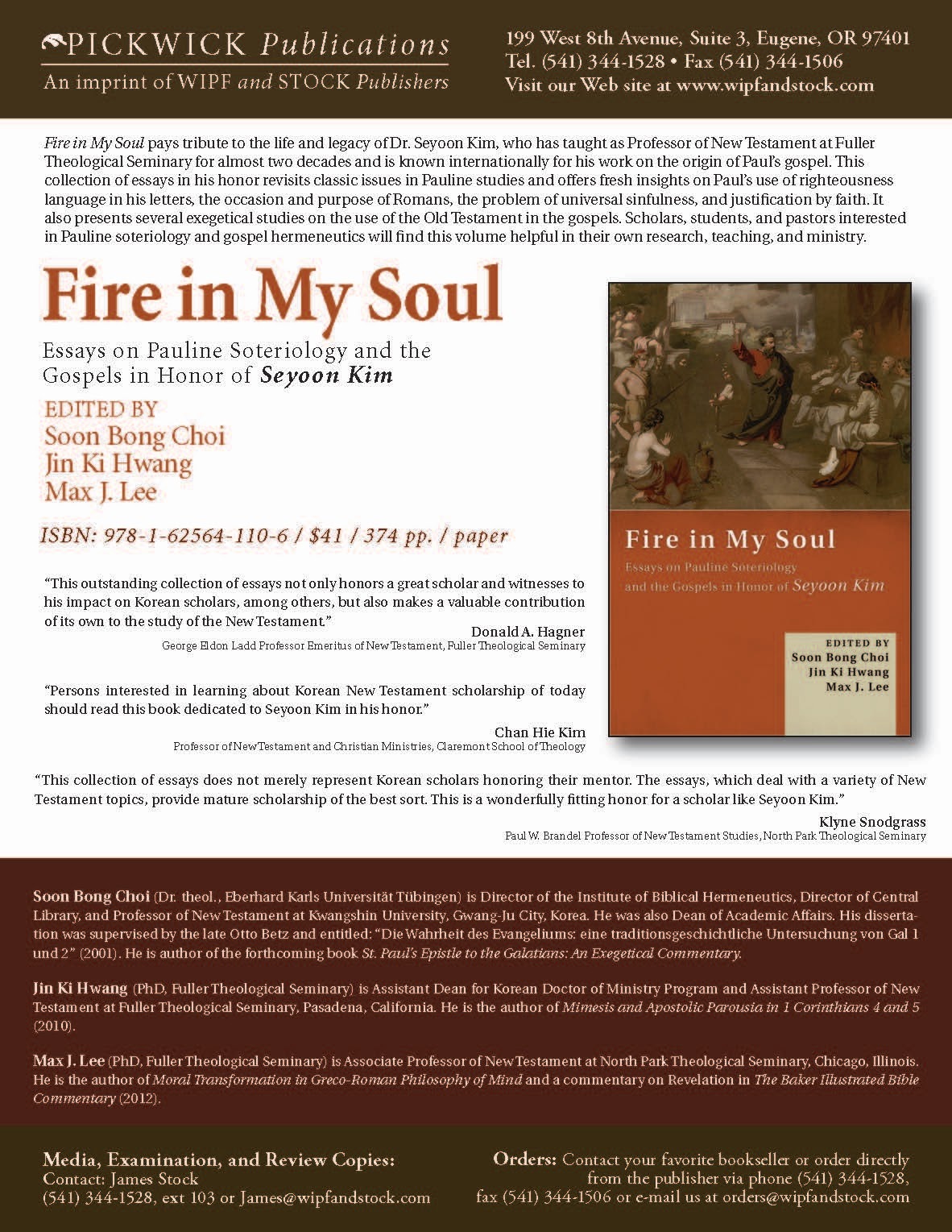 |
| Click here to order a print edition at Wipf & Stock online |
Let me highlight just some of the essays. First up are my own two essays which I hope to turn later into chapters for my next monograph after the WUNT manuscript is complete under the same title: Greek Words and Roman Meanings. Anyone familiar with David Hill's classic book on righteousness language in the New Testament can see from my title the appreciative nod I give to his 1967 book Greek Words and Hebrew Meanings. In his work, Hill argues that the Greek words δικαιοσύνη, δικαιόω, and their cognates function as linguistic shells for the Hebrew words tsedeq(ah)/tsadaq. But I argue in my essays that Greek words do not have Hebrew meanings, but (Greco-)Roman ones as part of the common (Κοινή) vernacular of Paul's day. To make a long story short, I have remapped the lexicon on righteousness language so Septuagintal influences on the definitions have been removed. In this way, when we examine Septuagintal echoes in Paul concerning his language of justification, we have a starting or reference point by which to gauge the strength of an OT echo and how much it extends or changes the semantics of the δικ(αιο)- word group as it was commonly employed in the every day discourse of the Greco-Roman world.
If we look at the key players in the current debates on justification (e.g., N.T. Wright, Douglas Campbell, Michael Gorman, Michael Bird, Douglas Moo, and others), all these scholars attribute a unique definition of "righteousness" to Paul based on a different set of OT texts to which they think Paul refers in his letters. I argue that the more "unique" Paul's use of righteousness language is from their typical Κοινή usages, the greater burden is placed on the NT scholar to prove that the supposed OT echo is there in the Pauline text, and the echo changes the meaning of the δικ(αιο)- word group in the way they think it does. I've discovered, for example, that forensic language in Paul need not have to appeal to the LXX for its source material but there are numerous Greco-Roman juridicial texts which provide working definitions for how Paul used righteousness/justification language in his letters.
But enough about my essays, here are some other gems. In Chapter 6 (The Internal Integrative Motive Running through 2 Cor 11:23-12:10), Brian Kim argues that the opponents of Paul in 2 Corinthians take OT traditions concerning the false prophet and use these traditions to accuse Paul of being a false apostle. Paul, however, takes this moment to reflect on what does it mean to be an apostle of Christ? He takes his opponent's accusation that physical illness is a sign of God's judgment against a false prophet and turns it into a theology of weakness which identifies an authentic apostle.
In Chapter 7 (Matthew's Use of the Septuagint and its Implications), Jin Hwang (a fellow editor) has studied Philo's practice of quoting Scripture as an analogue for how Matthew employs OT echoes in his gospel. Hwang not only offers a comprehensive analysis of Matthew's use of the Septuagint but also demonstrates that Matthew's citation practices align well with the methods of other Hellenistic Jews like Philo. Hwang also provocatively suggests Matthew's audience might be Greek-speaking Jews of the Diaspora who would appreciate the transliteration of Hebrew/Aramaic words.
One last example. In Chapter 15 (Methodological Similarity between Xunguxue and Biblical Exegesis), Hyeon Woo Shin offers a comparative study of the gospel genre with the long-standing history of critical exegesis in China called Xunguxue. Shin argues that the rhetorical devices used by the gospel writers might find better analogues in Chinese exegetical practices (e.g., huwen, or synonymous parallelism; hexu, or word order; and even hermeneutical principles as "scripture interpreting scripture") than Western literary models. Shin's essay helps illustrate how one methodological approach can serve as a comparative foil for another to reveal the strengths and weakness of each.
I hope you get a chance to pick up the volume and read the rest of the essays. Many thanks again to all the contributors and staff at W&S for all their hard work. Soli Deo gloria!
No comments:
Post a Comment